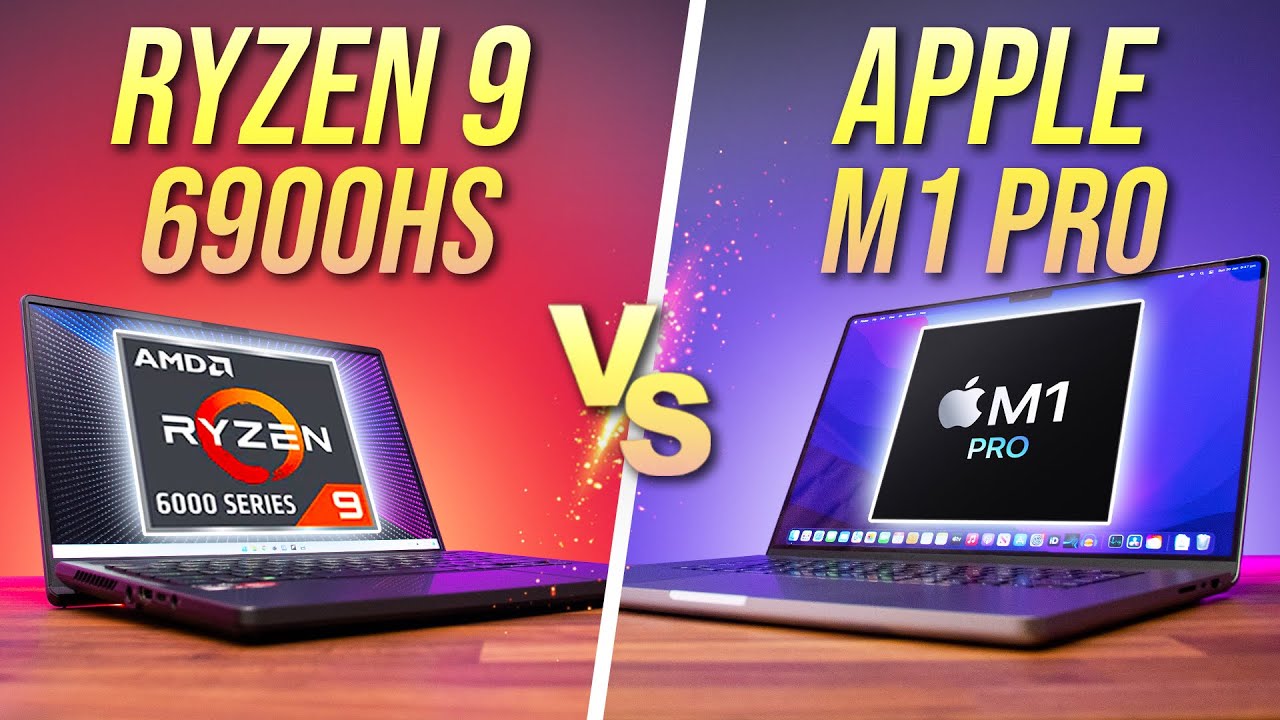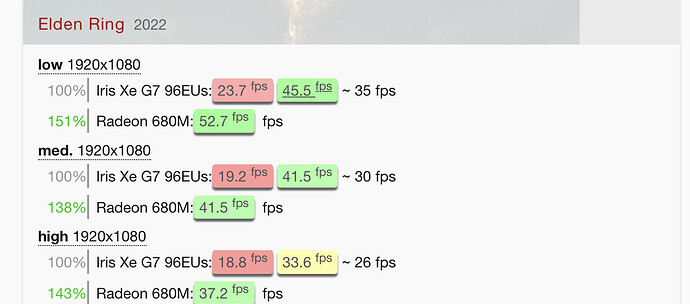Share and discuss AMD-related news here.
I’m happy to see improvements in iGPU performance. One caveat, however, is that they’re comparing a Asus ROG Zephyrus G14 w/AMD Ryzen 9 6900HS 3.3GHz, a top-end highly tuned gaming device, to an average of devices utilizing Xe Graphic 96EU, which gets dragged down in many instances by some really poor implementations. Example:
Where the Xe dog is an Honor MagicBook 14, i7-1165G7 2.8GHz and the one that nearly matches AMD has an i5-11320H 3.2GHz.
There’s also drivers to consider. As with Nvidia comparisons, some things run better on AMD. Some don’t.
Regardless I think it’s clear that AMD takes the lead for now. ![]()
Finally!!!
I personally am very interested in the potential of these newest low power chips from AMD. It’s almost like they really listened to our complaints about their unreleased predecessor ( and which I was momentarily slightly internet famous for half a second).
We just received our samples this week, but if they prove in real world what they promise on paper, they will get a home in at least two of our custom devices, and I think will see broader adoption in the ultra thin and light space generally, a space where to date Intel’s u series chips have been unopposed.
Again this is not about raw performance but efficiency.
AMD Ryzen 6000 U Tested: The Ideal Chip for Ultraportables? | PCMag
Yeah, leave the benchmark boasting to Intel and their “laptop” processors that dim the neighborhood lights.
Zen 4-based Ryzen 7000 looks pretty ho-hum. It looks like Zen 3+ on desktop, with the majority of performance gains coming from the increased, up to 5.5 GHz clock speeds. A 15% single-thread uptick means, when put together with the gains from clock speed, the IPC gain is 5% or less. The other dead giveaway that Zen 4 is a snore fest is AMD used Blender as the benchmark to compare performance with 12th Gen Alder Lake, and we know how well 5950X fares across the average multicore aggregate of most programs: about 15% slower. Blender already was faster on the Ryzen 9 5950X than the 12900K. So at best, Zen 4 is looking like it is bringing AMD to parity in performance with Alder Lake one year later. That’s nothing to be proud about and it honestly makes me strongly disappointed in this release, which should have been designated as a + or intermediate release, not a denoted with a full digit gain. AMD has their work cut out for them with Zen 5 since it will need to make up for the paltry gains in Zen 4 and then some to keep up with Intel and the processor market (especially Apple) in general.
@Hifihedgehog I did a double take when I first read your post since it wasn’t glowing about AMD ![]()
Seriously though, AMD does seem to be borrowing from Intel lately specifically the tick-tock approach to chip revisions. In other words especially coupled with the new motherboards, I think it will set the stage for a significant aggregate performance bump eg. the faster southbridge will benefit graphics cards and the better NVME support will improve SSDs.
Tests wil tell, and to date we’ve only read about them.
PS: I’m actually more interested in AMD’s new low power Intel u series competitor, not just for our own devices, but to break the strangle hold intel has the ultra thin and lights.
Well, the one positive is starting with Ryzen 7000, all Ryzen desktop processors will have integrated graphics and are all APUs. Just as the article states, that should make it more appealing to corporate customers wanting graphics without an additional add-in board/video card in their build configurations. Outside of this, I stand by my statement that Zen 4 is not much to look at. It is at best equal to Alder Lake, over one year later after their competitor’s release. Some are suspecting this is a die shrink of Zen 3+ with the periphery bells and whistles of DDR5 and PCIe 5.0 added. Given the uncompelling nature of Ryzen 7000, the bright side is they will be forced to price below their competitor to maintain relevancy. So if they have any sense and they want any cents, Ryzen 7000 should be a bit cheaper out of the gate than Ryzen 5000 and Zen 3 when at that time (2020) Intel was still floundering with 11th Gen.
Well…

![]()
![]() I’ve spoken negatively about AMD before. Bulldozer was a dumpster fire, a souped-up Atom processor at best and an outright lie to consumers at worse. It wasn’t until Ryzen that they were even worth considering. I will call out any manufacturer for shenanigans, AMD or Intel or Apple or whoever it may well be. This is AMD sandbagging and it will work against them and, in fact, I hope it does so they remember painfully that success isn’t a cheap experience. We need bold innovators on both sides because the cost for anything less soils and slows the market with complacency.
I’ve spoken negatively about AMD before. Bulldozer was a dumpster fire, a souped-up Atom processor at best and an outright lie to consumers at worse. It wasn’t until Ryzen that they were even worth considering. I will call out any manufacturer for shenanigans, AMD or Intel or Apple or whoever it may well be. This is AMD sandbagging and it will work against them and, in fact, I hope it does so they remember painfully that success isn’t a cheap experience. We need bold innovators on both sides because the cost for anything less soils and slows the market with complacency.
We kid, all in good fun. ![]()
Have you heard anything in regard to thermal curves and performance? That’s proving to be the Achilles heel (actually the whole leg ![]() )of Alder Lake.
)of Alder Lake.
And improved thermal performance was a goal for 4 according to what an AMD engineer told us awhile back.
As to the integrated graphics, this is anecdotal of course, but one unsung feature of 11th gen core 5 and later is XE graphics. Certainly below even a low end mainstream dedicated card, but OTOH they seem to have crossed the threshold of “good enough” for at least some more casual users. I expect these to be better but my question is to what degree.
The other question I have about this version of AMD integrated graphics is video decoding which has been a relative weak spot, compared to Intel’s frankly unexpectedly impressive performance in that area.
With the increasing (and very welcome trend IMHO) of better high resolution displays, that’s one of the very first “tests” most consumers do on their new systems according to our MS rep. I.E how well does it play Netflix and You Tube.
Unduly negative in my opinion.
Ignoring that Intel are still yet to properly pay for their disgraceful behaviour (and likely never will), they really aren’t that far ahead. And in the mid/mobile CPU area they only doing so by chugging back power.
And let’s not get started on how their graphics division is still a mess (well, they did hire Raja Koduri…)
Ah, Koduri. I could never stand that guy, besides him always sounding vacant upstairs. That executive is a total mess. There was a Reddit exposé some time ago from an Intel employee about how Koduri wasted company funds on party buses with drinking, cigars, women, and other frivolous expenses. Koduri’s biggest weakness is he never gives anything substantive. He sweet talks you in saccharin-soaked upper-level generalities of prevailing technologies (just the superficial trending concepts that any tech journalist knows, so really not that much) the industry is exploring but he never talks of specific goals and key deliverables. He is a smooth talker and a slick salesman and that’s about all he’s good for. Mr. Poor Volta is all you need to know: talks big, but he never gives specifics or promises which is why a trail of failures always follows in his wake. Arc Alchemist is MIA at Computex, which is another way of saying it is DOA with NVIDIA and AMD’s next-gen products only months away from release.
Of course this comes with the caveat that he knows far more about designing GPUs than any of us here.
But he really does sound like a piece of work and it’s not surprising that Intel’s GPUs are late and largely MIA. Intel GPUs and Raja sound like a perfect storm. His departure from AMD did not sound convivial at all.
AMD have used Vega a lot, but really that’s not really been from choice, rather necessity and wanting to not completely waste an investment. It’s not terrible, but it’s not good. Thank goodness they’ve now managed to move on from it.
Purportedly too, according to the article, Zen 3 was Keller’s last contribution at AMD meaning Zen 4 and 5 would have been produced by a different team. That might explain the mediocre performance improvement, where current estimates show a mediocre ~5% IPC improvement from Zen 3 to Zen 4 which is absolute chicken feed compared to the double digit gains that previous full digit generation passing-of-the-batons (Zen+ → Zen 2 was 15% and Zen 2 → Zen 3 was 19%) at AMD were getting. I have to wonder if an ARM-based AMD processor would have given them a serious performance leg-up in the notebook and 2-in-1 markets that have traditionally been an Intel stronghold, especially with the removal of the X86 legacy instruction inefficiencies. Could it have been Microsoft Surface’s Apple M series killer that are really needing right about now? Without all the X86 encumberments holding it back, I would say yes.
Perhaps?
But x86 would still be chugging along, we’d likely have less choice, AMD would be competing in a very crowded market, and a marlet that may well end up being overtaken by RISC-V, in which case they’d have to turn their business yet again.
Most of this is internal company politics though. And while Jim Keller is a chip god, him moving on from pet projects that were around because of his backing puts them at risk. Of course, there was no obligation for him to stay, but he gave up his power to influence decisions at AMD when he left (to Intel of all places).
Further, he’s no longer there, so doesn’t really know what’s going on at AMD. Perhaps they do still have the ARM work stashed away, perhaps being updated/maintained, but don’t see the need for it yet?
Way in to rumor land but we heard a lot around the time MS and Qualcomm first released the SQ1, that AMD was working on their own ARM based design. It even had a code name “ultra ARM”. That coincided with a bunch of hires that AMD made of multiple former Nvidia Shield engineers
But since then, nary a peep.
OTOH both ARM and X86 designs more and more from each other, for example Intel’s Iris XE borrowing a lot of ideas from the Mali graphics from Qualcomm
AMD are still on a roll with x86, so they likely don’t see a point in competing with themselves. They can afford to keep an ARM team working as a backup or for far future products, especially if it’s, according to Keller, not that different to x86.
If Zen 4 or 5 flop, then they may switch to ARM. It doesn’t look like it though.
I couldn’t disagree more. They are not shaping up is the point. AMD already has to close the gap of the 25% single-threaded performance lead that Intel gained with Alder Lake over Zen 3 with Zen 4. Plus Zen 4 has to be competitive with Raptor Lake that is likely to bring at least a single-digit gain in single-threaded performance. The fact that AMD is quoting only a 19% single-threaded performance gain means they won’t even be quite with parity with Intel in single-threaded performance on a one-year-old product (Alder Lake). And that deficit is set to only widen with Raptor Lake and its successors set to bring colossal gains for Intel. So no, this is not exactly a strong trajectory for Zen 4 and 5 when Intel is finally getting down to business again with Raptor and Meteor Lakes.

